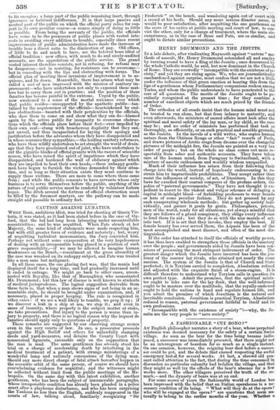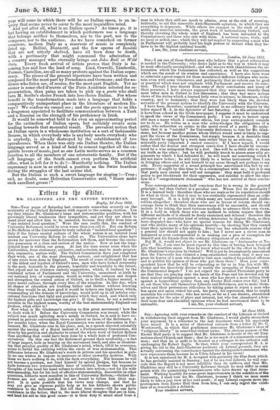A FASHIONABLE "Cut BONO ? "
AN English philosopher narrates a story of a bear, whose perpetual existence was deemed necessary for the -safety of a certain Swiss village. As soon as the bear for the time being became indis- posed, a successor was immediately procured, that there might not be an interregnum of beardom for so much as a single instant. On one occasion, however, the reigning bear died before a succes- sor could be got, and the debate that ensued respecting the awful emergency last 4 for several weeks. At last, a shrewd old pea- sant called attention to the fact, that during the time consumed in discussion no particular calamity had befallen the village, and that they might as well try the effects of the bear's absence for a few weeks more. The other villagers perceived the truth of the re- mark,—and the dynasty of bears was at an end.
For some scores of years the fashionable world of London has been impressed with the belief that an Italian operahouse is a ne- cessary condition of its being. "'What will they do at the opera? who will be engaged at the opera ? " are questions that seem na- turally to belong to the earher months of the year. Whether a
year will come in which there will be no Italian opera, is an in- quiry that seems never to occur to the most inquisitive mind. And yet after all, what is an Italian opera ? As times go, it is but having an establishment in which performers use a language that belongs neither to themselves, nor to the poet, nor to the composer, nor to the audience. As we have remarked on former occasions, modern Italy as a reservoir of music is completely dried up. Bellini, Donizetti, and the few operas of Rossini that are not utterly shelved, have all been done to death, with a pertinacity that might command the admiration of a country manager who eternally brings out John Bull or Wild Oats. Every fresh arrival of artists proves that Italy is be- coming less and less the land of song. Lind, Cravelli, Tamberlik, Formes, Castellan, are all so many protests against the Italian supre- macy. The pieces of the present repertoire have been written and composed for the most part by Frenchmen and Germans ; and the au- dience who listen are, of course, for the most part English. Yet no sooner is some. chef-d'teuvre of the Paris Academie seleeted for re- presentation, than pains are taken to pick up a poeta who shall turn M. Scribe's choice French into less choice Italian. For whose benefit is the transformation made into a language that holds a comparatively unimportant place in the literature of modern Eu- rope We confess we cannot see ; and the poeta appears to us like a dragoman appointed to facilitate communication between a Turk and a Russian on the strength of his proficiency in Irish.
It would be somewhat bold to fix even an approximating period for the extinction of Italian opera, but certainly events seem tending towards that mournful result. The prevalent notion that an Italian opera is a wholesome institution as a sort of fashionable Bourse, in which everybody who is anybody meets everybody who is anybody, is already destroyed by the establishment of two operahouses. When there was only one Italian theatre, the Italian language served as a kind of bond to cement together all the ex- quisite lovers of music, just as one Latin motto serves as a common junction to all the members of one aristocratic family. But if the soft language of the South cannot even perform this artificial office, what is left for it to do P—Manifestly nothing. The Italian supremacy is now in as critical a position as the Swiss beardom during the struggles of the last ursine idoL
But the Italian is such a sweet language for singing !—True ; and, no doubt, some Helvetian Conservative said, "Bears make such excellent grease !"



























 Previous page
Previous page